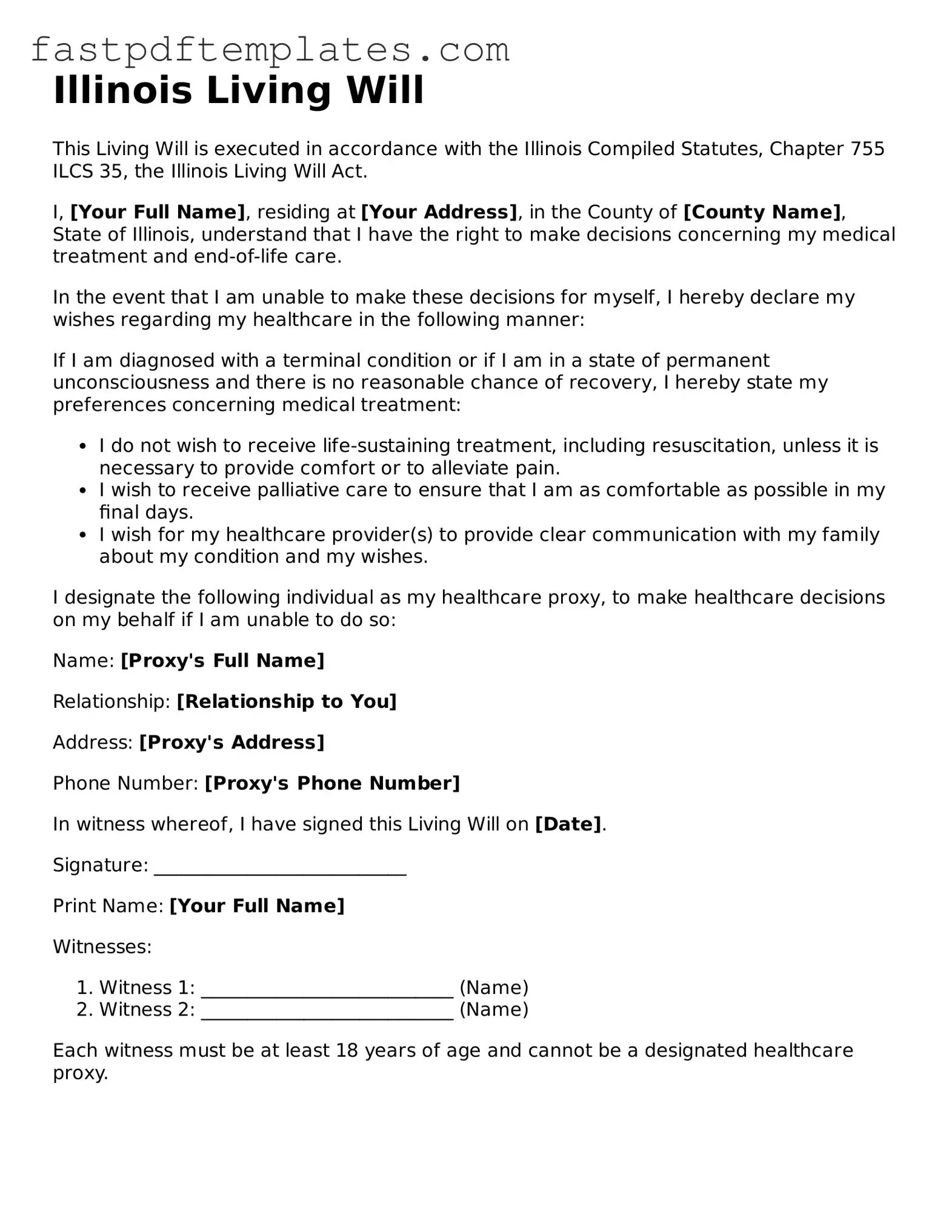The Illinois Living Will form is similar to the Advance Directive, which serves as a general term for documents that outline an individual's healthcare preferences in advance. Both documents allow individuals to express their wishes regarding medical treatment in case they become unable to communicate those wishes themselves. An Advance Directive can encompass a variety of instructions, including those related to life-sustaining treatments, making it a broader category that includes Living Wills.
Another document comparable to the Illinois Living Will is the Durable Power of Attorney for Health Care. This document designates a specific person to make healthcare decisions on behalf of the individual if they are incapacitated. While a Living Will outlines specific medical preferences, a Durable Power of Attorney allows for flexibility, as the appointed agent can make decisions based on the circumstances at hand, which may not be explicitly covered in a Living Will.
The Do Not Resuscitate (DNR) order is also similar to the Illinois Living Will. A DNR specifically instructs medical personnel not to perform CPR or other resuscitative measures if the individual's heart stops or they stop breathing. While the Living Will addresses a broader range of medical treatments, the DNR focuses solely on resuscitation efforts, making it a critical component of end-of-life planning.
The Physician Orders for Life-Sustaining Treatment (POLST) is another document that aligns with the Illinois Living Will. POLST translates an individual’s healthcare preferences into actionable medical orders. Unlike a Living Will, which is often completed in advance and may require interpretation, a POLST form is designed to be easily accessible and followed by healthcare providers in emergency situations.
Health Care Proxy documents share similarities with the Illinois Living Will as well. This document appoints someone to make healthcare decisions on behalf of an individual when they are unable to do so. Like the Durable Power of Attorney, it allows for a trusted person to interpret and apply the individual’s wishes regarding medical treatment, though it may not specify those wishes in detail.
The Advance Healthcare Directive is another document that is closely related to the Illinois Living Will. This directive combines elements of both a Living Will and a Durable Power of Attorney, allowing individuals to state their healthcare preferences while also appointing an agent to make decisions on their behalf. It provides a comprehensive approach to planning for future healthcare needs.
The Mental Health Advance Directive is similar in that it allows individuals to express their preferences regarding mental health treatment. This document is particularly important for those with mental health conditions, as it can specify treatment options, medication preferences, and appoint someone to make decisions if the individual is unable to do so. While a Living Will primarily focuses on physical health, this directive addresses mental health needs.
The Revocable Living Trust can also be seen as related, though it primarily focuses on asset management rather than healthcare decisions. However, it allows individuals to outline their wishes for asset distribution and management in the event of incapacity or death. While not a healthcare document, it complements the Living Will by ensuring that financial matters are addressed in line with the individual’s overall wishes.
The Declaration of Guardian for Adults is another document that bears similarity to the Illinois Living Will. This document allows individuals to designate a guardian for themselves in the event of incapacity. While a Living Will focuses on healthcare preferences, the Declaration of Guardian addresses legal and personal decision-making, providing a more comprehensive plan for an individual’s future.
Finally, the End-of-Life Care Plan is similar in that it encompasses a broader view of an individual’s wishes regarding their care at the end of life. This plan can include preferences for palliative care, hospice services, and specific instructions for family members and healthcare providers. It serves as a comprehensive guide, much like a Living Will, but may also address emotional and spiritual aspects of end-of-life care.

